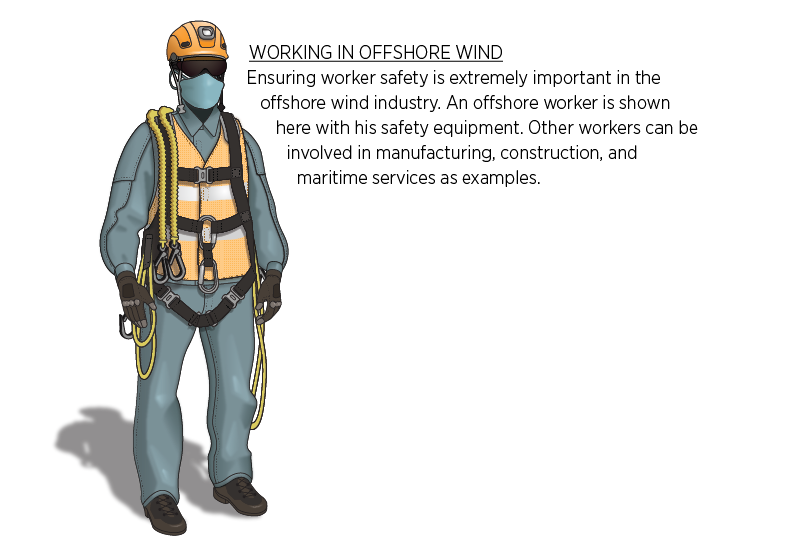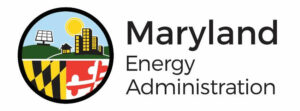Offshore wind jobs come in all shapes and sizes. A recent report identified 74 different occupations necessary for the work of building and operating an offshore wind farm, including welders, pipefitters, engineers, ship captains, painters, and iron workers. Maryland’s wind projects are expected to create thousands of jobs. In 2017, the Maryland Public Service Commission (PSC) awarded offshore wind renewable energy credits (ORECs) to MarWin I and Skipjack 1 and estimated the projects would create 4,997 new direct jobs. In 2020, the agency estimated the Momentum Wind and Skipjack 2 projects would create an additional 10,000 direct jobs. Some jobs will be short-term, such as construction jobs for new facilities or port upgrades, but others will last upwards of two decades as offshore wind projects require routine maintenance to stay operational.
Several Maryland organizations offer training courses for skills or certifications required to work in the industry, such as welding training, specialized certifications to work on an offshore wind turbine, and maritime operation training.
Many of the skills, certifications, and knowledge used within the offshore wind industry are transferable. The transferability of skills and certifications in the clean energy industry can be categorized as follows:
- Direct transfer: Core qualifications and technical knowledge are essentially the same, allowing for easy transition between sectors.
- Refocus: Similar work, but some skill or knowledge upgrading may be required.
- Reboot: Significant effort is needed to qualify for a new position due to very different work requirements, – NOTE: the majority of jobs within the different clean energy sectors and their adjacent industries will not require a “reboot” of upskilling.
The offshore wind industry values a combination of specific technical certifications and broader educational qualifications, with many skills being transferable across different sectors within the industry.
Some of the skills that are transferable include:
1. Project management
2. Health, Safety, and Environmental (HSE) Knowledge
3. Regulatory understanding and compliance
4. Problem solving and troubleshooting
5. High Voltage Electrical skills
6. Instrumental skills associated with understanding the day-to-day operations of a renewable energy project
7. Equipment and machinery skills
The skills and knowledge gained in one sector of the clean energy industry could be transferred to another renewable energy project in the following ways:
Smart grid systems: Develop and implement advanced monitoring and control systems for smart grids, is essential for integrating renewable energy sources into the existing power infrastructure.
Wind and solar farm monitoring: Designing and maintaining monitoring systems that track the performance, efficiency, and output of wind turbines and solar panels.
Energy storage solutions: Improving and monitoring energy storage technologies, which are critical for managing the intermittent nature of renewable energy sources.
Data acquisition and analysis: Optimizing renewable energy systems and predicting maintenance needs.
Control systems: Designing and implementing control systems is essential for managing the complex operations of renewable energy facilities.
Sensor technology: Monitoring environmental conditions, equipment performance, and energy output in renewable projects.
Safety systems: Developing and maintaining safety protocols and systems in renewable energy installations.
Performance optimization: Fine-tune renewable energy systems for maximum efficiency and output.
Grid integration: Developing systems that allow seamless integration of renewable energy into existing power grids.
Troubleshooting and maintenance: Identifying and resolving technical issues in renewable energy systems, ensuring their reliable operation.
Environmental monitoring: Developing systems to monitor the environmental impact of renewable energy projects.
Energy efficiency: Improving the overall energy efficiency of renewable systems through precise measurement and control.
In addition to skill transfer, there is the ability for some certifications to transfer from one renewable energy project to the next, helping to secure the economic sustainability through job security for individuals interested in moving into the clean energy industry.
Some of the certifications that are transferable include:
- Occupational Safety and Health Administration (OSHA) Safety certification: Widely recognized safety certification applicable across energy sectors.
- Leadership in Energy and Environmental Design (LEED) certification: Focused on sustainable building practices.
- Building Performance Institute (BPI) certification: Relevant for energy efficiency and building performance.
- Global Wind Organization (GWO) certification: Demonstrates transferable safety and technical skills, specific to the offshore wind industry, however relevant for other offshore renewable energy projects.
- Electrical systems certifications:
- Advanced Certificate in Renewable Energy Electrical Systems Installation and Maintenance (REESIM): This certification covers various aspects of renewable energy systems, including wind turbines, solar power, photovoltaics, geothermal, and hydrogen power.
- Renewable Energy Certificate: This certification focuses on alternative and renewable energy systems, with an emphasis on photovoltaic systems and compliance with North American Board of Certified Energy Practitioners (NABCEP) standards.
- Graduate Certificate in Renewable Electric Energy Systems: This advanced certification covers topics such as renewable electric energy systems, power system operation and control, electric power system protection, and smart electric power distribution systems.
- Certified Renewable Energy Professional (REP™): Offered by the Association of Energy Engineers, this certification recognizes expertise in renewable energy generation, production, and storage technologies.
- Commercial Wiring Certificate: While not specific to renewable energy, this certification covers the National Electric Code (NEC) and commercial wiring systems, which are relevant to renewable energy installations.
- Industrial Wiring Certificate: This certification focuses on industrial electrical installations, including work with transformers and programmable logic controllers used in the industry.
- Residential Wiring Certificate: This provides a foundation in the National Electric Code (NEC) as it applies to residential applications, which can be relevant for residential renewable energy installations.
- Renewable Energy Professional (REP) certification: Offered by the Association of Energy Engineers.
- Certified Energy Manager (CEM) certification: Also offered by the Association of Energy Engineers.
Several Maryland organizations offer training courses for skills or certifications required to work in the industry, such as welding training, specialized certifications to work on an offshore wind turbine, and maritime operation training.



